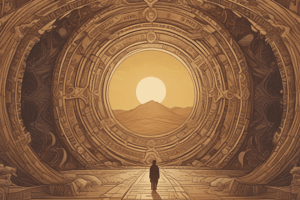Podcast
Questions and Answers
What is the goal of musician Gordon Downie's fundraising efforts?
What is the goal of musician Gordon Downie's fundraising efforts?
To raise $100 million for reconciliation efforts in Canada.
What is the purpose of Camp Anokijig, which receives the proceeds from Joseph Boyden's book?
What is the purpose of Camp Anokijig, which receives the proceeds from Joseph Boyden's book?
To offer Indigenous youth a safe environment to rediscover their cultural identity and reconnect with the land.
What is the main message Joseph Boyden wants Canadians to understand about reconciliation?
What is the main message Joseph Boyden wants Canadians to understand about reconciliation?
That education is key to reconciliation efforts and creating a better future for Indigenous people.
Flashcards are hidden until you start studying
Study Notes
Author Joseph Boyden discusses his new book "When We Were Alone" and the legacy of residential schools in Canada
-
The book "When We Were Alone" by Joseph Boyden tells the tragic story of a 12-year-old Anishinabe boy named Johnny when Jack who froze to death after running away from a residential school in Northern Ontario.
-
Johnny is one of thousands of Indigenous children who were taken away from their families and put into residential schools, which were known for abuse, malnutrition, and disease.
-
The Truth and Reconciliation Commission has collected thousands of names of Indigenous children who did not survive residential schools, and the number may be as high as 30,000.
-
The government purposely did not keep records of the deaths in these schools, which is why residential schools were an unknown thing until recently for most Canadians.
-
The intergenerational trauma caused by residential schools has led to suicide epidemics and alcohol abuse in Indigenous communities.
-
Indigenous people across Canada are the most resilient people, but the pain caused by residential schools must be recognized and addressed for true reconciliation to occur.
-
The relationship between Indigenous and settler peoples in Canada needs to change to become more inclusive and allow Indigenous people to be part of the nation.
-
Joseph Boyden wrote a Heritage Minute about Johnny's story to shed light on the darker side of Canadian history and grow as a nation.
-
The proceeds from "When We Were Alone" go to a camp called Camp Anokijig, which offers Indigenous youth a safe environment to rediscover their cultural identity and reconnect with the land.
-
Suicide was almost unheard of in Indigenous communities before contact with settlers, and the shame factor surrounding mental health must be eliminated to let Indigenous youth know that they are perfect just the way they are.
-
Camp Anokijig helps youth reclaim their cultural heritage through projects such as drum-making, learning songs in their language, and building winter shelters.
-
The camp also teaches Indigenous history to the youth, explaining that without Indigenous people, Canada would not be a nation and that they are responsible for Canada as much as Canada is responsible for them.Interview with Joseph Boyden on Reconciliation and Indigenous Issues in Canada
-
Gordon Downie, a musician, is raising money for reconciliation efforts in Canada with the goal of raising $100 million.
-
Boyden believes education is the foundation for change and positive progress in reconciliation efforts.
-
Indigenous women are four times more likely to be murdered in Canada, and reconciliation for them would mean being able to walk down the street without fear.
-
Indigenous parents fear finding their children dead by suicide, and reconciliation for them would mean being able to live without that fear.
-
Indigenous children should have access to clean drinking water like the rest of Canada, but many reserves are without running water or have been under boil advisories for decades.
-
Funding for students on reserves in Ontario is only half of what it is for students who don't live on reserves.
-
There is a real imbalance in Canada between Indigenous and non-Indigenous people, and the playing field needs to be leveled.
-
Stereotypes about Indigenous people are perpetuated by those who have never met a Native person or been to a reserve.
-
CBC has had to remove comments on Indigenous stories due to racist undertones and remarks.
-
Canadians are responsible for fixing the broken system and reaching out to learn about Indigenous culture and issues.
-
Education is key to reconciliation efforts and creating a better future for Indigenous people.
-
Boyden believes that unexpected individuals can teach us more than we ever imagined about Indigenous culture and reconciliation.
Studying That Suits You
Use AI to generate personalized quizzes and flashcards to suit your learning preferences.




